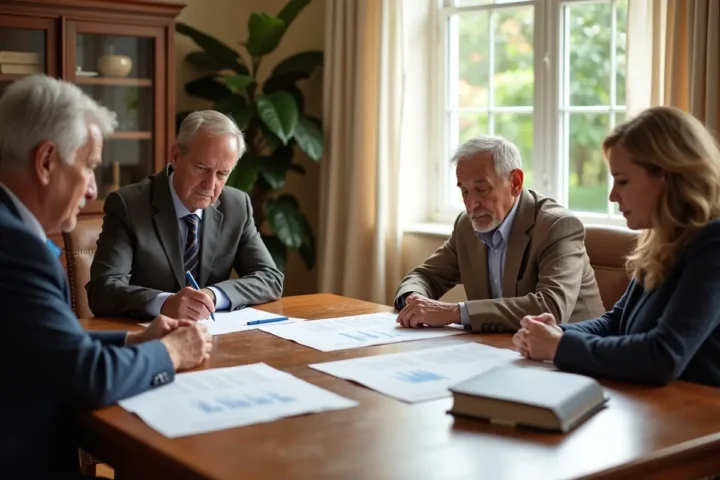What Families Should Know About Estate Planning Before It’s Urgent
Families often postpone estate planning until illness, loss, or financial urgency forces quick decisions, yet waiting amplifies hardship. Clear direction about property, medical care, digital accounts, and financial obligations spares relatives from making painful choices in stressful moments. Thoughtful preparation offers stability when emotions run high and prevents unnecessary conflict.
Today’s families face blended households, cross-generational retirement savings, and complex online records, making planning more essential than ever. Without written instructions, confusion multiplies and legal hurdles delay closure.

Recording beneficiaries, healthcare wishes, and trusted contacts turns a difficult subject into a lasting gift of clarity. Even small, steady actions taken early ease tomorrow’s burdens and turn responsibility into peace of mind.
Why Estate Planning Connects to Real-Life Choices
The objects and accounts families rely on daily—homes, heirlooms, bank records, and digital logins—quickly become sources of confusion when preferences remain unspoken. Relatives are left to interpret intentions during moments of grief, often leading to disputes. Written instructions for distributing property, naming an executor, and planning final arrangements, even details as personal as the choice of a funeral casket, remove uncertainty and protect relationships.
Conversations about healthcare wishes, financial management, and decision-making roles provide understanding where silence leaves assumptions. Clear language in directives, shared with key contacts, prevents misunderstanding and builds trust. Keeping important files in secure storage, with one trusted person informed of access, makes later transitions smoother, more compassionate, and far less overwhelming.
Essential Documents That Shape a Plan
A will, a financial power of attorney, and advance directives turn intentions into clear, enforceable instructions. A will names heirs and details how assets divide; trusts or specific bequests can shorten probate. A financial power of attorney grants a trusted agent authority over accounts and bills if incapacitated, while a healthcare proxy plus advance directives record treatment choices and comfort preferences.
Designating guardians for children and appointing a trustee for managed assets protect loved ones from difficult decisions later. Timestamp document versions after every major life change, and keep one certified paper copy and one encrypted digital copy, both accessible to a named contact. Organized preparation reflects care that extends beyond words.
Financial Details Families Need to Review
Finances often determine how smoothly responsibilities pass to loved ones. Overlooked details—outdated beneficiaries, forgotten accounts, or unclear debt management—can delay access to funds and increase costs. An organized review of retirement plans, insurance policies, and outstanding loans each year keeps financial commitments clear and manageable for heirs. Small corrections today prevent major administrative headaches later.
Equally important is assigning who handles specific financial tasks. From mortgage payments to final medical bills, clarity reduces stress on grieving family members. Life insurance choices should be tied directly to family needs—replacing income or covering final expenses. A concise financial summary stored securely, with contact details included, becomes a practical gift of stability and reassurance.
Communication That Prevents Family Disputes
A short, scheduled family meeting cuts surprises and steadies emotions. Limit sessions to 45 focused minutes, invite only those who must make decisions, and bring a neutral facilitator if past tensions exist. Record one-page minutes, email a summary to absentees, set a clear date for follow-up, and name a single contact for questions.
Flag likely friction points — heirlooms, care costs, or online accounts — and agree on a few resolution methods, such as equal shares or a designated custodian. Confirm each person’s agreement to named duties and pick backups. Store the one-page roles-and-contacts in an encrypted document folder and update it after meetings.
Practical First Steps to Start the Process
A tidy inventory prevents confusion later. List property, bank and retirement accounts, passwords, safe-deposit boxes and key heirlooms with location and access notes. Gather wills, account statements, powers of attorney and healthcare directives, then keep one paper copy and one encrypted digital copy a named contact can access.
Legal checkups reveal state rules and tricky trustee language. Ask an estate attorney to confirm guardianship wording, beneficiary fields and trust terms, and to name alternates. Store paper and encrypted cloud copies and notify one trusted person. Review files after marriage, a child, moves, or major financial changes. An annual reminder to inspect documents helps keep things current.
Taking time to prepare is less about paperwork and more about care for the people who matter most. Each updated account, signed directive, and thoughtful conversation shows commitment to family trust and stability. Addressing property, healthcare, and financial matters in advance turns uncertainty into clarity and compassion. Regular attention to details—such as refreshing guardianship plans, reviewing beneficiaries, or updating stored records—creates resilience that adapts with life’s changes. Even the smallest step taken today eases tomorrow’s burdens. Careful preparation provides reassurance now and lasting protection for the future, turning responsibility into a meaningful legacy across generations.


